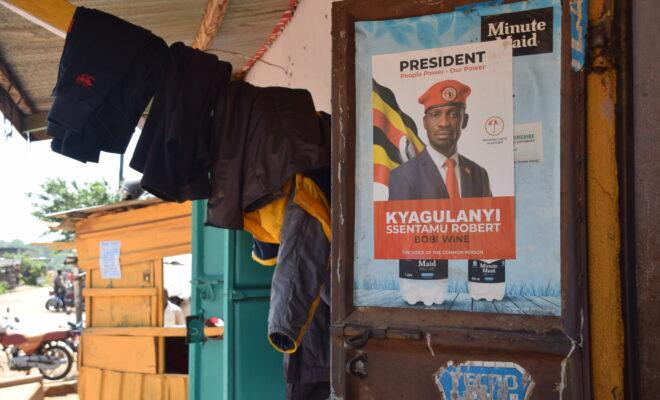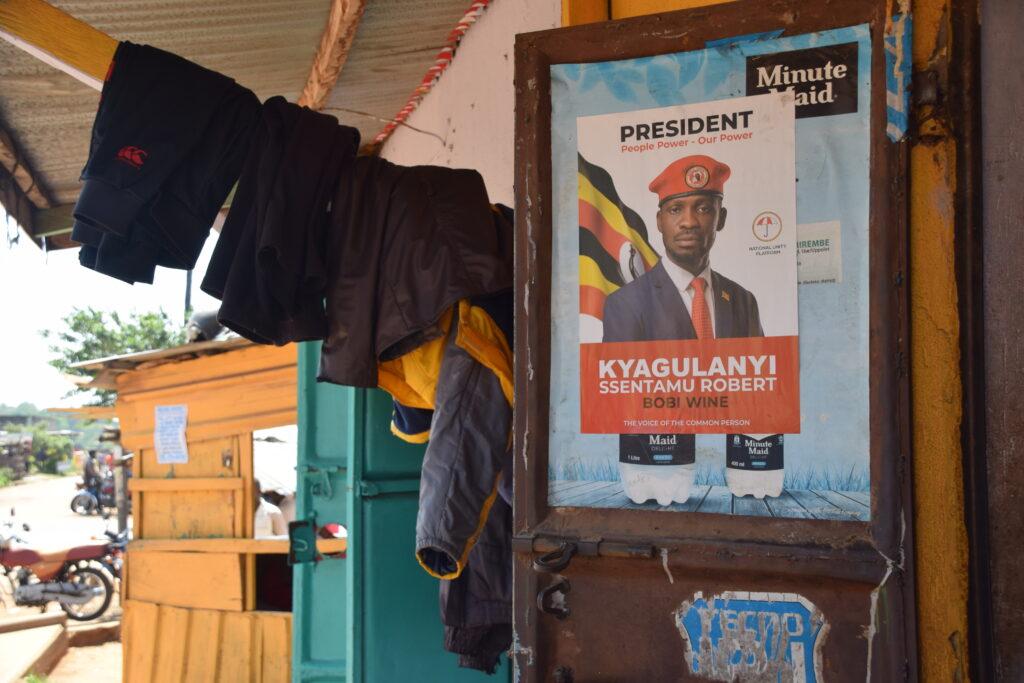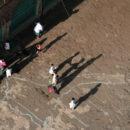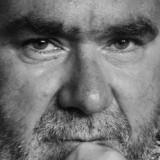Anywhere but Kampala: “I’m still in NRM but I cannot clap for bad vices”

Is the opposition making inroads in Uganda’s Eastern region ahead of the 2021 elections? We took the political temperature in three different places.

Campaign posters in Budaka. Credit: Liam Taylor.
High on the slopes of Mount Elgon, a circle of men is gathered around a bucket of malwa, a millet beer. Here in the eastern Ugandan district of Kween, they sip the sludgy homebrew through long straws, swapping jokes and village gossip. Sometimes, the talk turns to politics. It is one month until the elections scheduled for 14 January 2021.
“Some years ago, the Karimojong would steal our cows,” recalls one man, referring to a history of conflict with the pastoralist people to the north. He says that Yoweri Museveni, who came to power in 1986, put a stop to that. “When this president came in there was peace and security within our communities…People are saying we need to give the mzee another term.”
There is a murmur of agreement, but not from the trio of younger men across the room. “We are going to vote opposition,” says one, “because we are not even getting anything from Museveni.”
A line has been crossed. The village chairman ushers us out the door. As we leave, shouts and nervous laughter erupt behind us.
It is in places like Kween, far from the hubbub of the capital Kampala, that the 2021 election will be won and lost. Museveni and the ruling National Resistance Movement (NRM) have built their political base in the countryside through a mixture of coercion, co-option and consent. The main challenger Bobi Wine, a quintessentially urban figure, will need to reach the villages where three-quarters of Ugandans live if he is to claim victory.
Is political sentiment in these areas shifting? With opinion polls scarce and campaign rally attendance only a loose measure of support, we took the political temperature at three different places in eastern Uganda: an NRM stronghold, an opposition-leaning city, and a “swing district”. We found a country ill at ease.
Sebei: “The people have opened their eyes”
At a hotel in Kapchorwa district, members of the local NRM committee are sinking into their armchairs, exuding an air of easy confidence. As well they might. In 2016, President Museveni won the three districts of the Sebei sub-region with ease, garnering 67% in Kapchorwa, 71% in Kween and 81% in Bukwo.
Yet such dominance takes work. Kibet Asadi, the local chairman of the NRM Workers’ League, says that before the last election “most of the people were running to [opposition leader Kizza] Besigye”. A promised road to the Kenyan border had not materialised and people felt ignored.
Faced with dwindling support, Museveni found an unlikely cheerleader: Kenya’s deputy president William Ruto. Like most people in Sebei, Ruto is from the Kalenjin ethnolinguistic group and his appearance on the campaign trail swung support back to Museveni. “When Ruto came in he really talked to our people in the language that our people understand,” says Asadi. In 2018, when tarmacking finally began on the road, Museveni was joined by the Kenyan politician to commission it.
President Museveni is a master at juggling local grievances such as these. But with each passing year, there are more frustrations to resolve.
Along the boundary of Mount Elgon national park, villagers complain that they can no longer graze cattle or collect forest products. “[Park rangers] get you with a small firewood and, instead of being treated like a human being, you are beaten like an animal,” laments one woman who, like many others, asked not to be named. Her friend says that most people here supported Museveni in 2016 but that this time “it’s half and half”.

NUP candidate Harriet Chemutai Simba. Credit: Liam Taylor.
Harriet Chemutai Simba, a businesswoman, is one person that switched allegiance. She previously campaigned for her uncle, an ambassador and former NRM minister, but is now running to be an MP in Kapchorwa on the ticket of Wine’s National Unity Platform (NUP).
“NRM has lost its glory,” she says. It was once enough to bring security from cattle rustlers, she suggests, but now people expect more. “The people of Sebei have finally opened their eyes.”
Such sentiments are growing even in remote villages. The problem for the opposition is turning sympathy into votes. There are nine parliamentary seats up for grabs in Sebei sub-region, yet Chemutai is the only NUP candidate. Moreover, most people we spoke too had not seen any NUP presence on the ground and there is little evidence the party has the structures to monitor the vote count.
This is a problem that has long faced Besigye’s party, the Forum for Democratic Change (FDC). Like the FDC, but even more so, NUP relies on a charismatic leader while lacking strong grassroots structures.
In part that is because the state makes it hard to organise. “There is a lot of intimidation,” says Sebeyi Satya, a former member of the NRM youth league who is now the NUP’s regional co-ordinator. Both he and Chemutai add that the government has tried to buy them off.
Mbale: “They scare our old people”
One place where the opposition is well-organised is in the busy city of Mbale, which has long been a bastion of FDC support. Besigye won the most votes here in 2016 and performed strongly in the wider Bugisu sub-region.
Here the election is not just a struggle between the NRM and its opponents. It is also a tussle between opposition parties. It is only in Bobi Wine’s home region of Buganda that opposition stalwarts have joined the musician-turned-politician’s party en masse. In Bugisu, most NUP candidates are relative unknowns and are competing with established FDC rivals.
For Abbas Wetaaka, the NUP co-ordinator in the sub-region, that is the entire point. “The elites – the good people, the educated people, the people of substance – were involved with Besigye,” he says. “[But] those men and women of status are going to lose out for failure to understand what is at stake.”
Wetaaka suggests that in Mbale, a place of widening class fissures, Wine’s lyrics cut through to the “ghetto boys” and the marginalised. “This time the people are saying we shall help ourselves,” he says.
That analysis may be at least half right. Many opposition voters told African Arguments that they will still vote for the FDC at the local and parliamentary levels, but that they will back Bobi Wine in the presidential election over the FDC’s Patrick Oboi Amuriat, a bespectacled engineer who lacks Besigye’s popular appeal.

Uganda elections posters in Budaka. Credit: Liam Taylor.
Can Bobi Wine also eat into Museveni’s vote here? Demographic trends certainly favour the 38-year-old challenger over the 76-year-old incumbent. As a phone trader in Mbale market put it, children always outnumber their parents. Yusufu Kadama, the NUP youth co-ordinator in Mbale, says that Bobi Wine is seen as one of “our own”. He points out that, unlike Besigye who fought in the Bush War that brought Museveni to power in 1986, Wine “has no attachment with these bushmen”.
The NRM, however, is not one to allow a rival’s popularity to rise without responding. On Bobi Wine’s recent visits to Mbale therefore, the singer has drawn teargas and bullets as well as excitable crowds. Kadama has been arrested twice. In October, an NUP parliamentary candidate in Mbale said the police and army raided her house.
The NRM establishment worry that the youth have been led astray. “Those boys are very courageous,” says Muhamood Mutenyo Masaba, the NRM chairman in Mbale. “They don’t fear police. They scare our old people.”
Nonetheless, he is not concerned about the upcoming vote. There is a new main market in Mbale and a Chinese-owned industrial park has opened on the edge of town. With these developments, insists Masaba, the party’s vote will increase.
Not everyone, however, shares his confidence. According to an NRM activist visiting from the countryside, this election is “unique”. For the first time, he concedes, the opposition has support “deep in the village”.
Budaka: “I cannot clap for bad vices”
On the swampy plains west of Mbale, this sense of flux can also be felt in Budaka. It is perhaps a stretch to call this a “swing district”. All three sitting MPs are NRM and Museveni won 61% of the vote here to Besigye’s 36% in 2016. However, those percentages exactly matched the two candidate’s vote share nationwide. Although nowhere is “typical”, Budaka comes close.
Some voters here reiterate the mantra that Museveni alone can guarantee peace and stability. Jennifer Nalongo Wenene, a shopkeeper and NRM activist, says that supporting Bobi Wine is like “chewing sweets”: children like it, but it ultimately won’t satisfy you. She thinks his followers are “kiwaani” (fake), a word popularised by one of Wine’s own songs.
Yet the opposition candidate is winning some of petty functionaries and middle-aged businessmen that were once a backbone of NRM support. Several people express horror at the handling of recent protests in which the state shot at least 54 people dead. “People are not able to express themselves democratically,” says a retired party official who is voting for Wine. “I’m still in the NRM but I cannot clap for bad vices.”
There are material grievances too: a sense that the state abandons people and then bullies them when they try to fend for themselves. The villains of this moral economy are the grasping taxmen, the officious traffic police, and the inspectors who confiscate substandard merchandise. One flashpoint has been the eviction of encroachers on wetlands. “There are wetlands where we get money, we grow our watermelon, grow rice, [but] Museveni himself said even if it rains or shines, no-one will remain there,” says a former NRM parish councillor who will vote for Wine.
This is the problem for Museveni. The likelihood is that he will win this election and, after some sporadic unrest, things will continue as before. But with each turn of the wheel, disaffection grows. It will take ever more money, and ever more violence, to maintain his rule. On our journey through the east, we saw the rust eating away at the cogs of the still-powerful NRM machine. With a little oil, it will keep running for a while. But one day, it will grind to a halt.

Credit: Liam Taylor.





